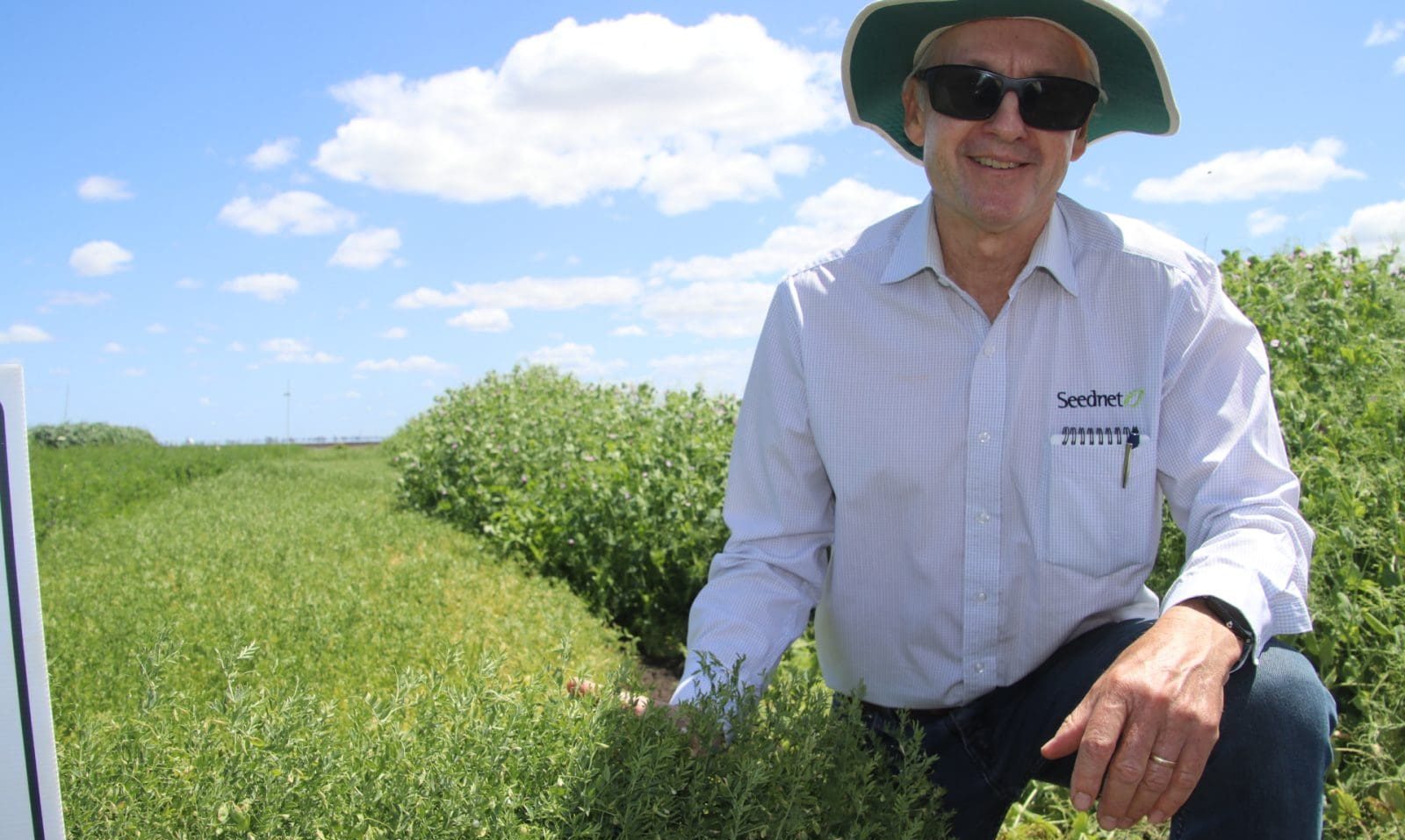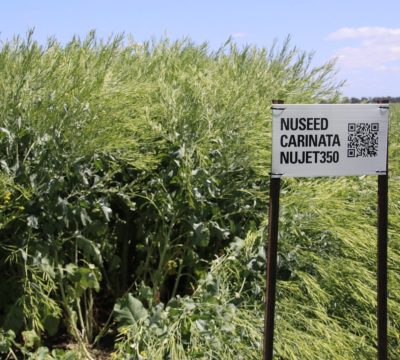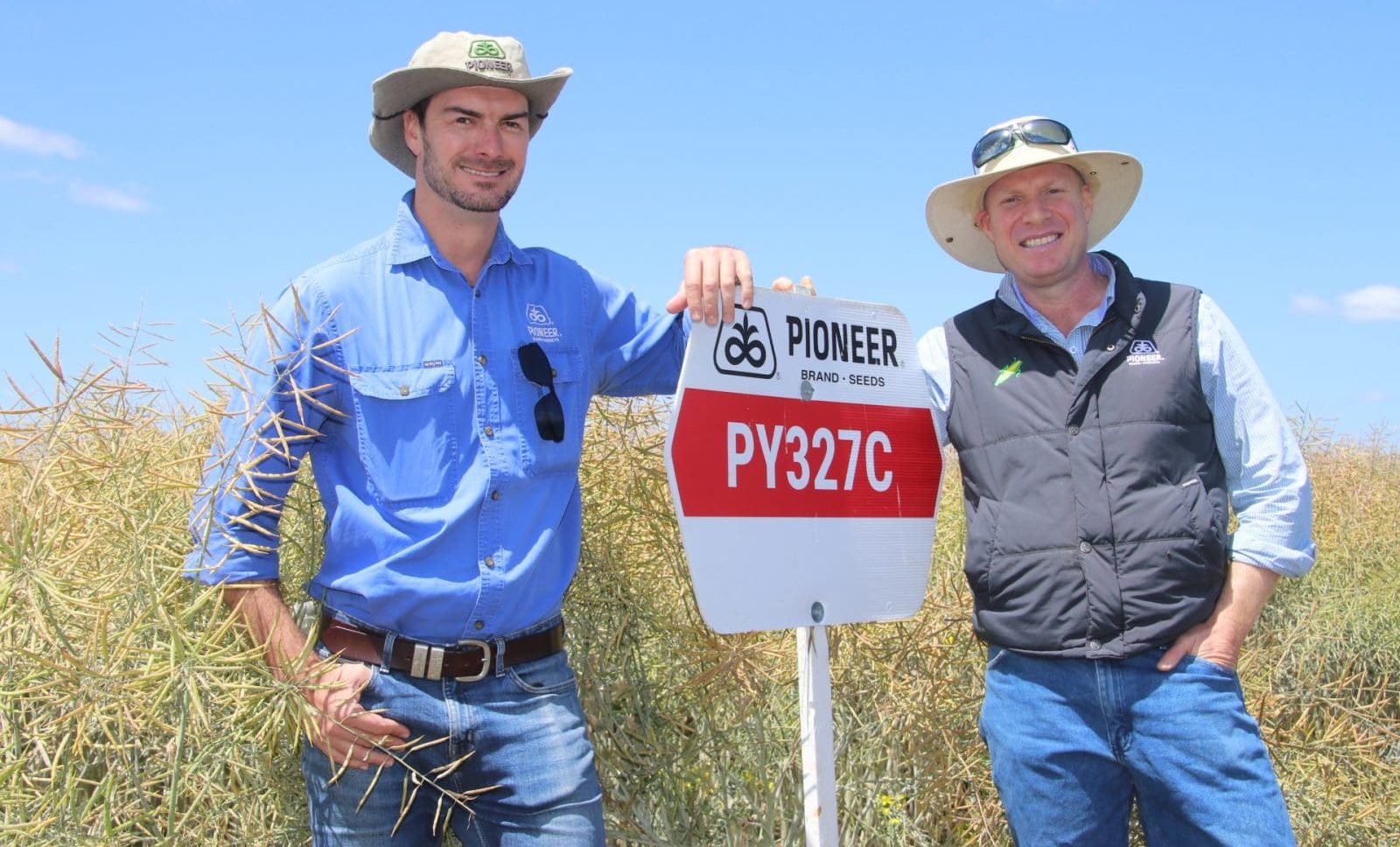
Seednet north eastern Australia territory sales manager Jon Thelander in a crop of Kelpie red lentils being trialled at Tosari.
SEED companies have showcased the potential of new crops to transform northern New South Wales and southern Queensland farming systems at a recent field day at Tosari Research Centre near Millmerran last week.
Seednet, based at Horsham in Victoria’s Wimmera district, showcased trials of lentils and field peas, while BASF and Pioneer Seeds discussed canola varieties, and Nuseed presented a crop of a carinata, an oilseed designed for the biofuel market.
It was the first year Seednet has trialled lentils and field pea varieties in Queensland, with varieties planted at demonstrations sites in Kingaroy, Emerald and Goondiwindi, as well as Tosari.
Seednet north eastern Australia territory sales manager Jon Thelander said the Tosari site featured Kelpie red lentils and Morgan field peas.
He said there was an opportunity to grow both crops in “lighter country” often not suited to chickpeas, Qld’s dominant winter pulse crop.
“With the lentils, what I am imagining is that they are going to go best on the very light soil, well drained, with stubble, and, in terms of maturity, I think we are probably looking at…an almost June-type planting window,” Mr Thelander said.
“Field peas have the beauty of being the versatile pulse as far as wide pH range, so they will go into really acid soils through to really alkaline soils.”
“They’ll tolerate more sodic soils compared to the other pulses, as well as growing happily in these beautiful soils as well.
“The other thing about field peas…is the tremendous biomass that can also be of advantage with breaking down the wheat stubble from a crown rot point of view.”
Mr Thelander said both crops also had ready-made markets which could service greater tonnages from northern growing regions.
Currently, Bean Growers Australia from Kingaroy, Goondiwindi-based Woods Group, and AGT Foods, which has a packing plant at Narrabri in northern New South Wales, all truck in lentils from southern growing regions.
Mr Thelander said lentils “had been trading at $750-1000 a tonne year in year out” and had offered a premium over chickpeas before the removal of the Indian tariff in May.
However, he said it was expected that lentils would become the more profitable option in times of lower chickpea prices.

Nuseed carinata growing at the Tosari Research Centre.
“We are looking at commercial crops next year and I think there will be a handful of them.
“We will select the paddocks and growers very carefully.”
Carinata on trial
Also on display at Tosari, carinata demonstrated strong potential as a new crop for southern Qld.
This year marks the first commercial trials of Nuseed carinata in Australia with a total of 150ha being cultivated at Carpendale near Goondiwindi and Gunnedah in northern NSW, as well as several smaller plots, such as at Tosari.
Nuseed carinata representative Rob Austen said more data was needed on the crop, but it has shown promise in traditional cotton-growing regions.
Mr Austen said “it was still early days” but the crop appeared to be yielding well, in addition to providing disease and weed-control benefits.
“We think it’s going to help the verticillium and black root rot in cotton, and potentially with crown rot and root-lesion nematodes in cereals,” Mr Austen said.
He said Nuseed was looking to expand trial locations and were targeting sites in parts of the western Darling Downs and more western cotton-growing regions of northern NSW.
“At the moment, our accumulation site is at Carpendale…because that is where most of it is in the ground this year, but we are planning to get one at Dalby and another further south, around Narrabri.”

Pioneer Seeds technical support manager Ken Haxen and Pioneer Seeds territory sales manager Ben Thrift talked up the benefits of canola for northern growing regions.
Canola has fit
Although still a rarity in southern Qld, seed companies BASF and Pioneer Seeds touted the potential of canola at the Tosari field day.
In Qld, canola is currently grown in small pockets, mostly in the Goondiwindi region, but has been limited due to frost and heat-stress issues, and the lack of a crush facility.
Pioneer Seeds technical support manager Ken Haxen said as knowledge has improved around planting windows and agronomy, canola was emerging as a promising staple crop for the region.
“It’s really handy to have some alternative options up our sleeves for our cropping systems,” Mr Haxen said.
“As interest has grown and we have learnt more and more about it, we really see this as a key growth area for canola.”
Mr Haxen said a “key focus” for his work was optimising the planting window, which traditionally had opened on Anzac Day.
“We were planting it way too late and opening ourselves up to all sorts of risks at the back end of the season.
“What we have been learning with the work we have been doing over the last couple of years is earlier is better.
“So far, we are seeing the opportunity to sow canola in early April.
“I continue to push that window and continue to investigate the options to sow even earlier.”
Without a crush facility in close proximity, Qld-grown canola currently goes into the feed market.
Pioneer Seeds territory sales manager Ben Thrift said the feed market for canola was estimated to be “in excess of 20,000 tonnes”.
He said Pioneer was in talks with the industry to promote the crop and expand the market.
“We are working alongside industry partners and grain markets to try and bolster that market because we see canola has a tremendous fit for growers,” Mr Thrift said.
The Tosari Research Centre is a 748ha research and commercial-cropping facility operated by not-for-profit organisation Queensland Crop Research.
It is managed by a board of directors alongside commercial and university partners.
Grain Central: Get our free news straight to your inbox – Click here